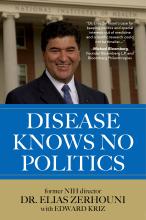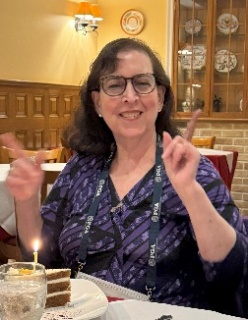Book Reviews

Disease Knows No Politics
Dr. Elias Zerhouni (with Edward Kriz)
July 15, 2025
ISBN-13: 978-1493090624
Contact: Anthony Pomes, apomes@globepequot.com
Edith G. Tolchin (edietolchin.com/book-reviews)
“First and foremost, I believe that disease knows no politics. . .” introduces the humanitarian that is Dr. Elias Zerhouni.
Dr. William Brody, famed radiologist and academic administrator, states in the Foreword, “Dr. Elias Zerhouni has an uncommon mind. He’s a once-in-a generation talent. He thinks on a different plain. Where others see problems, he sees solutions.”
Born in Pointe Pescade, Algiers in 1951 to a large family, Zerhouni’s early years were disciplined though often frightening due to discord between the French and Algerians. He spoke fluent Arabic and French.
“Given that Algeria was a poor country. . .” Zerhouni had to rely on self-education by researching at the foreign embassies—which enabled him to pass national exams. He studied German and music, and met his future wife, Nadia Azza, when she was 17.
After a summer job in quality control, he decided on premed at University of Algiers. During another summer job, he learned that “It was about alleviating human suffering.” He would be a radiologist and would study in the United States.
But first he had to learn English. He successfully completed med school, was awarded a radiology internship (and later, a residency) at Johns Hopkins, married Nadia in 1975; she would study pediatric endocrinology.
Baltimore, at that time, proved to be a “war zone,” thus providing the best ER training in radiology and long, 12-hour shifts. Early training in Algiers enabled Zerhouni to fill in for techs or nurses as needed.
“The partner one chooses in life can make or break their future.” Nadia birthed their son, Will, while doing a pediatric endocrinology fellowship. Zerhouni chose a specialty in thoracic radiology. Their second child, Yasmin, was born in 1979.
East Virginia Medical School became his new home base in 1981. He developed his own research business and worked on many publications along the way. After four years, he took a pay cut but returned to Hopkins—with Nadia’s approval—for a richer opportunity.
A third child was born in 1985, Zerhouni treated the late President Reagan, and began research on cancer with MRI. Throughout his career, his wisdom yielded numerous innovations: “Nothing is impossible.”
Zerhouni served on the National Cancer Institute’s Board of Scientific Advisors from 1998-2002, where he learned “the good, the bad, and the ugly of the NIH. . .” He began to feel like a (circus) plate spinner with so much responsibility. He birthed many successful organizations and supported interdepartmental research.
His three children, Will, Yasmin, and Adam all excelled—one in law, one in medicine, and one in art. Zerhouni eventually had the family’s long-promised waterfront property built.
Zerhouni was torn when asked to run the National Institutes of Health; Nadia supported him. He competed with Anthony Fauci but won. In his 2002 acceptance speech he included, “. . . disease knows no politics.”
Over the years, he had to deal with many emergencies such as bioterrorism after 9/11 and the SARS emergency in 2003. Along with Fauci, two brilliant minds worked together.
Zerhouni often dealt with radical religious groups who questioned NIH projects. “I wasn’t going to get. . .mixed up in politics,” including with HIV and stem cell research. He retired from the NIH in 2008 with a handwritten letter of gratitude from President Bush.
He then became senior fellow for the Gates Foundation’s Global Health Program and worked as a presidential envoy for Obama.
While spearfishing for octopus in Turkey, Zerhouni decided to then head Sanofi’s R&D in Paris in 2011, near his family. They recruited stars who created new biologics and created new companies for varied research, and he remained there until 2018.
Then COVID hit the world in 2020, and he became unprepared to retire. “One must be able to grasp their environment. . . and the changes that are occurring. . . It’s a race between good and evil.”
He concludes, “What we do for others matters.”
Disease Knows No Politics, by Dr. Elias Zerhouni (with Edward Kriz) is an Algerian immigrant’s story of true grit, humility, hard work and American leadership, recounted in a friendly, casual yet technical, name-dropping yet informative manner. However, the reader might have obtained a complete story had the book ended before the Epilogue, which was, principally—though often factual—an opinion piece.
Expect invaluable insider information on the bureaucracy and brilliance of the operations of various government medical agencies. Zerhouni’s timely sagacity should be heeded: “If we want the creative minds . . . to come to our shores, America must embrace policies that welcome their arrival.”

Edith G. Tolchin has been a journalist, editor, author, and book reviewer since 1998.
She has written five books, most recently Fanny on Fire and Secrets of Successful Women Inventors. She has done over 150 interviews and 55 book reviews. Contact her at edietolchin.com.
